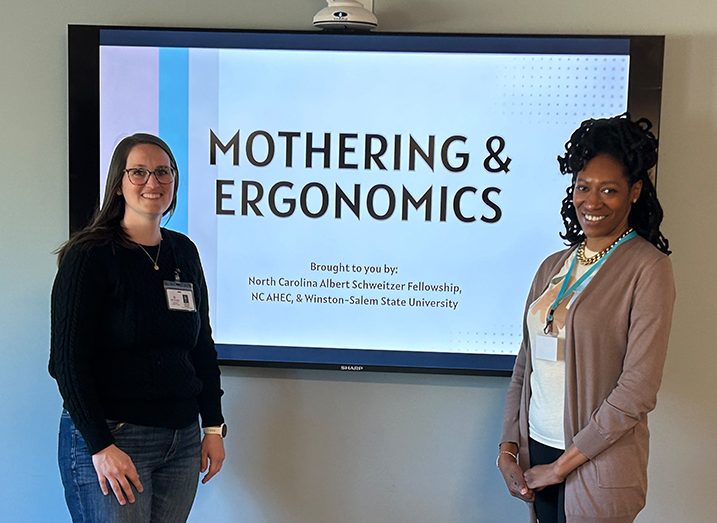Two graduate students from Winston-Salem State University, Cristina Sorensen and Stefanie Ramsey, have developed a unique ergonomics training program to help mothers reduce the physical strain of caring for young children. Their innovative project was recognized with the 2024 Future Healthcare Legend Award during the recent Healthcare Legends of East Winston Awards Luncheon.

Sorensen is a student in the occupational therapy program. Ramsey is pursuing her family nurse practitioner degree. Both mothers who understand firsthand the demands of parenting. They observed the physical toll that lifting, bending, and repetitive motions take on mothers as they care for their infants and toddlers. “The lifting, carrying, and repetitive motion that is required combined with body changes resulting from pregnancy put women at an increased risk of injuries in their shoulders, neck, back, and wrist,” Sorensen noted.
Addressing an Issue They Faced
This personal connection to the challenges of motherhood inspired Sorensen and Ramsey to collaborate on their project, which emerged from their application for the Albert Schweitzer Fellowship. In partnership with the Albert Schweitzer Fellowship, the North Carolina Area Health Education Centers, and the Forsyth County Health Department, the program aims to educate mothers in East Winston-Salem on injury prevention strategies.
“Our project aims to help women in East Winston-Salem avoid and manage pain and injury,” Sorensen explained. The classes are tailored for mothers with children under six years old, a stage where substantial lifting and carrying occur. The program has reached approximately 40 participants through the local health department.
As part of their initiative, Sorensen and Ramsey have created and distributed 3D-printed ergonomic devices, including grocery bag carriers, bag hooks for carts and strollers, and tools designed to alleviate the strain of unbuckling car seats. The $2,500 prize awarded to them will be used to expand the program. Their plans include producing instructional videos, providing transportation for participants, and developing bilingual materials in Spanish to ensure wider accessibility.
With their sights set on continuing their important work, Sorensen will graduate this December, while Ramsey will complete her studies in May 2025.



